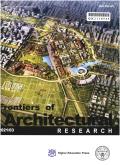基于智慧城市理念的苏州旧社区更新综合评价模型构建
IF 3.6
1区 艺术学
0 ARCHITECTURE
引用次数: 0
摘要
中国的快速城市化给城市发展带来了复杂的挑战,尤其是在老社区。数字城市的兴起以及从扩张到优化现有城市区域的转变凸显了与基础设施、再生和地方特色保护相关的重大问题。这些挑战阻碍了城市的可持续发展,并对居民的生活质量产生了负面影响,因此向智慧城市过渡势在必行。本研究以苏州老旧街区为研究案例,运用大数据和地理信息系统(GIS)软件进行全面的定量评估。核密度和可达性分析等技术揭示了基础设施、可持续性和地方特征方面的关键问题,为有针对性的战略提供了数据基础。在此基础上,本文提出了通过精细化管理,增强社区功能,提高居民生活质量的微改造策略。该研究强调,在“生态+数字”可持续发展框架下,更新老社区可以解决现有挑战,同时振兴城市,走向更智能、更绿色、更宜居的未来。本文章由计算机程序翻译,如有差异,请以英文原文为准。
Construction of a comprehensive evaluation model for old community renewal in Suzhou based on smart city concepts
Rapid urbanization in China presents complex challenges for urban development, particularly in older neighborhoods. The rise of digital cities and the shift from expansion to optimizing existing urban areas have highlighted significant issues related to infrastructure, regeneration, and the preservation of local characteristics. These challenges hinder sustainable urban development and negatively impact residents' quality of life, making the transition to smart cities imperative. This study uses Suzhou's old neighborhoods as a case study, employing big data and Geographic Information System (GIS) software to conduct a comprehensive quantitative assessment. Techniques such as kernel density and accessibility analysis reveal key issues in infrastructure, sustainability, and local characteristics, providing a data foundation for targeted strategies. Based on these findings, the paper proposes micro-renovation strategies aimed at enhancing community functionality and improving residents' quality of life through refined management. The study underscores that, under the “ecological + digital” sustainable development framework, renewing old neighborhoods can address existing challenges while revitalizing cities towards smarter, greener, and more livable futures.
求助全文
通过发布文献求助,成功后即可免费获取论文全文。
去求助
来源期刊

Frontiers of Architectural Research
ARCHITECTURE-
CiteScore
6.20
自引率
2.90%
发文量
430
审稿时长
30 weeks
期刊介绍:
Frontiers of Architectural Research is an international journal that publishes original research papers, review articles, and case studies to promote rapid communication and exchange among scholars, architects, and engineers. This journal introduces and reviews significant and pioneering achievements in the field of architecture research. Subject areas include the primary branches of architecture, such as architectural design and theory, architectural science and technology, urban planning, landscaping architecture, existing building renovation, and architectural heritage conservation. The journal encourages studies based on a rigorous scientific approach and state-of-the-art technology. All published papers reflect original research works and basic theories, models, computing, and design in architecture. High-quality papers addressing the social aspects of architecture are also welcome. This journal is strictly peer-reviewed and accepts only original manuscripts submitted in English.
 求助内容:
求助内容: 应助结果提醒方式:
应助结果提醒方式:


